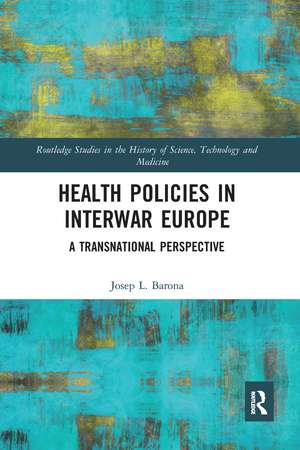Health Policies in Interwar Europe: A Transnational Perspective: Routledge Studies in the History of Science, Technology and Medicine
Autor Josep L. Baronaen Limba Engleză Paperback – 30 iun 2020
Din seria Routledge Studies in the History of Science, Technology and Medicine
- 5%
 Preț: 976.04 lei
Preț: 976.04 lei -
 Preț: 311.41 lei
Preț: 311.41 lei - 5%
 Preț: 296.12 lei
Preț: 296.12 lei - 18%
 Preț: 1017.91 lei
Preț: 1017.91 lei -
 Preț: 389.66 lei
Preț: 389.66 lei -
 Preț: 419.50 lei
Preț: 419.50 lei -
 Preț: 392.67 lei
Preț: 392.67 lei -
 Preț: 416.96 lei
Preț: 416.96 lei - 17%
 Preț: 259.07 lei
Preț: 259.07 lei - 5%
 Preț: 1158.84 lei
Preț: 1158.84 lei - 31%
 Preț: 764.20 lei
Preț: 764.20 lei -
 Preț: 436.02 lei
Preț: 436.02 lei - 18%
 Preț: 1000.27 lei
Preț: 1000.27 lei - 18%
 Preț: 1061.06 lei
Preț: 1061.06 lei -
 Preț: 450.40 lei
Preț: 450.40 lei - 16%
 Preț: 260.33 lei
Preț: 260.33 lei - 18%
 Preț: 956.07 lei
Preț: 956.07 lei -
 Preț: 389.11 lei
Preț: 389.11 lei -
 Preț: 287.41 lei
Preț: 287.41 lei - 25%
 Preț: 741.36 lei
Preț: 741.36 lei -
 Preț: 488.29 lei
Preț: 488.29 lei -
 Preț: 279.94 lei
Preț: 279.94 lei - 22%
 Preț: 327.96 lei
Preț: 327.96 lei - 12%
 Preț: 325.34 lei
Preț: 325.34 lei - 18%
 Preț: 905.45 lei
Preț: 905.45 lei - 17%
 Preț: 271.02 lei
Preț: 271.02 lei - 18%
 Preț: 888.68 lei
Preț: 888.68 lei - 25%
 Preț: 324.29 lei
Preț: 324.29 lei -
 Preț: 492.96 lei
Preț: 492.96 lei - 5%
 Preț: 1158.89 lei
Preț: 1158.89 lei -
 Preț: 416.22 lei
Preț: 416.22 lei -
 Preț: 489.26 lei
Preț: 489.26 lei - 25%
 Preț: 766.49 lei
Preț: 766.49 lei -
 Preț: 416.22 lei
Preț: 416.22 lei - 30%
 Preț: 768.10 lei
Preț: 768.10 lei - 33%
 Preț: 772.79 lei
Preț: 772.79 lei
Preț: 259.98 lei
Preț vechi: 311.41 lei
-17% Nou
Puncte Express: 390
Preț estimativ în valută:
49.75€ • 52.18$ • 41.41£
49.75€ • 52.18$ • 41.41£
Carte tipărită la comandă
Livrare economică 01-15 aprilie
Preluare comenzi: 021 569.72.76
Specificații
ISBN-13: 9780367587925
ISBN-10: 0367587920
Pagini: 186
Dimensiuni: 156 x 234 mm
Greutate: 0.45 kg
Ediția:1
Editura: Taylor & Francis
Colecția Routledge
Seria Routledge Studies in the History of Science, Technology and Medicine
Locul publicării:Oxford, United Kingdom
ISBN-10: 0367587920
Pagini: 186
Dimensiuni: 156 x 234 mm
Greutate: 0.45 kg
Ediția:1
Editura: Taylor & Francis
Colecția Routledge
Seria Routledge Studies in the History of Science, Technology and Medicine
Locul publicării:Oxford, United Kingdom
Public țintă
PostgraduateCuprins
Contents;Acknowledgments;List of Abbreviations;Health policies in the twentieth century: a transnational issue;Why transnational history?;Circulating science and technology;The civilising process and homo hygienicus;Historical origins of health policies;From public health to social medicine: the political dimension of disease;The birth of public health;International diplomacy and national institutions;The Office Internationale d’Hygiène Publique and the League of Nations;Networks of experts: national policies and transnational actors;Health and international diplomacy;Creating expert knowledge;Public health experts as transnational actors;the relevance of international organisations;Transnational actors guiding health research and health policies: the historical context of national health institutes;Legitimising arguments: moral values, health, and economy;Research for the nation: national institutes of hygiene;Bacteriology, a cornerstone for colonial medicine;Origins and impact of the Pasteur Institute;Robert Koch-Institut in Berlin;London School of Hygiene and Tropical Medicine and national research institutes in Britain;Social medicine and sanitary policies in Hungary;National Institute of Hygiene and Public Health in Poland;Central Institute of Hygiene in Belgrade;Prague as a social hygiene laboratory;Alfonso XIII National Institute of Hygiene in Madrid;Public health institutes in Scandinavia;Instructing the experts: national schools of public health;Teaching the experts: more than a national issue;National schools and public health experts;The international model: Johns Hopkins School of Public Health in Baltimore;Teaching hygiene in European nations: France, Great Britain, Germany, the Netherlands, Poland, Rumania, Hungary, Yugoslavia, and Spain;International initiatives: courses in London and Paris;The great failure: École Internationale d’Hautes Études d’Hygiène [International School of Advanced Studies in Hygiene];Final comments and conclusions;Sources and bibliography;Index
Notă biografică
Josep L. Barona is Professor of the History of Science and leader of the research group Sanhisoc/Health in Society at the Universidad de Valencia, Spain.
Descriere
Research into public health policies and hygiene instruction has been oriented traditionally in the national context and there is a rich historiography that analyses the development of health policies and systems in various European and American countries during the first decades of the 20th century. What is often ignored, however is the study o
